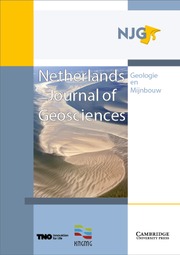Crossref Citations
This article has been cited by the following publications. This list is generated based on data provided by
Crossref.
Schäfer, A.
and
Siehl, A.
2002.
Preface: Rift tectonics and syngenetic sedimentation - the Cenozoic Lower Rhine Basin and related structures.
Netherlands Journal of Geosciences - Geologie en Mijnbouw,
Vol. 81,
Issue. 2,
p.
145.
Klett, M.
Eichhorst, F.
and
Schäfer, A.
2002.
Facies interpretation from well logs applied to the Tertiary Lower Rhine Basin fill.
Netherlands Journal of Geosciences - Geologie en Mijnbouw,
Vol. 81,
Issue. 2,
p.
167.
Karg, Harald
Carter, Andrew
Brix, Manfred R.
and
Littke, Ralf
2005.
Late- and post-Variscan cooling and exhumation history of the northern Rhenish massif and the southern Ruhr Basin: new constraints from fission-track analysis.
International Journal of Earth Sciences,
Vol. 94,
Issue. 2,
p.
180.
van Loon, A.J.
2009.
Unravelling the enigmas of the ‘silver sands’ in the Dutch/German/Belgian border area.
Netherlands Journal of Geosciences - Geologie en Mijnbouw,
Vol. 88,
Issue. 3,
p.
133.
Møller, L. K.
Rasmussen, E. S.
and
Clausen, O. R.
2009.
Clinoform migration patterns of a Late Miocene delta complex in the Danish Central Graben; implications for relative sea‐level changes.
Basin Research,
Vol. 21,
Issue. 5,
p.
704.
Prinz, L.
Zieger, L.
Littke, R.
McCann, T.
Lokay, P.
and
Asmus, S.
2017.
Syn- and post-depositional sand bodies in lignite – the role of coal analysis in their recognition. A study from the Frimmersdorf Seam, Garzweiler open-cast mine, western Germany.
International Journal of Coal Geology,
Vol. 179,
Issue. ,
p.
173.
DECKERS, JEF
and
LOUWYE, STEPHEN
2019.
A reinterpretation of the ages and depositional environments of the lower and middle Miocene stratigraphic records in a key area along the southern margin of the North Sea Basin.
Geological Magazine,
Vol. 156,
Issue. 3,
p.
525.
HOUTHUYS, RIK
ADRIAENS, RIEKO
GOOLAERTS, STIJN
LAGA, Piet
LOUWYE, STEPHEN
MATTHIJS, JOHAN
VANDENBERGHE, Noël
and
VERHAEGEN, JASPER
2020.
The Diest Formation: a review of insights from the last decades.
Geologica Belgica,
Vol. 23,
Issue. 3-4,
p.
199.
Macaluso, Loredana
Villa, Andrea
Mörs, Thomas
and
Mannion, Philip
2022.
A new proteid salamander (Urodela, Proteidae) from the middle Miocene of Hambach (Germany) and implications for the evolution of the family.
Palaeontology,
Vol. 65,
Issue. 1,
Śliwińska, Kasia K
Denk, Thomas
Dybkjær, Karen
Fredborg, Julie Margrethe
Lindström, Sofie
Piasecki, Stefan
and
Rasmussen, Erik Skovbjerg
2024.
Miocene vegetation and climate in the eastern North Sea Basin, onshore Denmark, compared to the present.
GEUS Bulletin,
Vol. 57,
Issue. ,
Siebels, Alexandra
ten Veen, Johan
Munsterman, Dirk
Deckers, Jef
Kasse, Cornelis
and
van Balen, Ronald
2024.
Miocene sequences and depocentres in the Roer Valley Rift System.
Basin Research,
Vol. 36,
Issue. 4,


